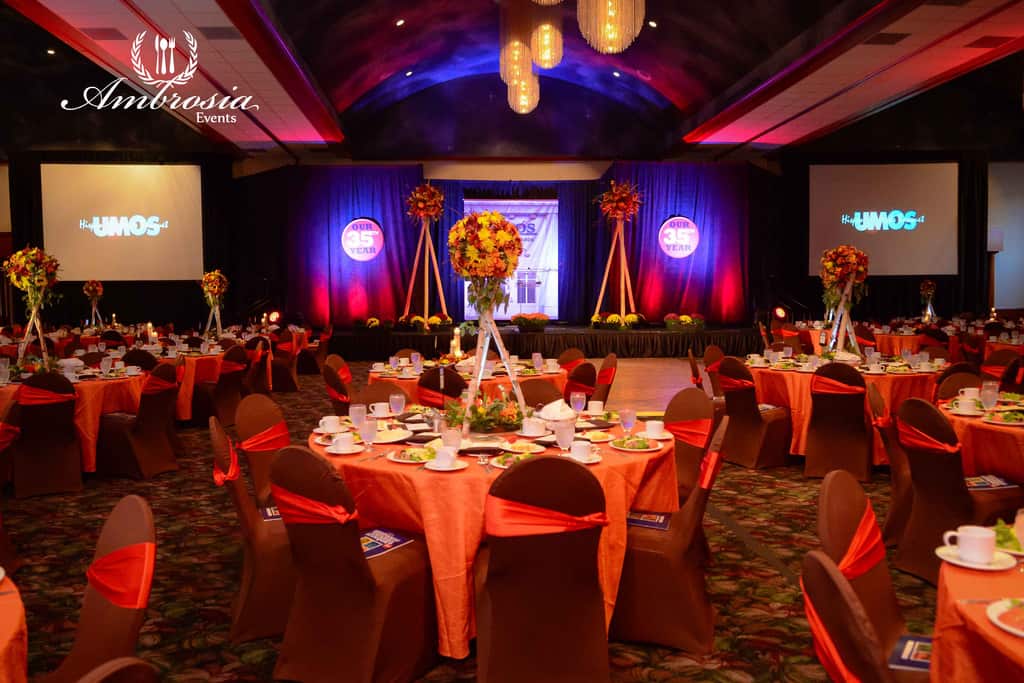Formal events like corporate parties are quite different to plan than the typical casual gatherings. How, you might ask? Well, for one; companies need to get their brand image across. Secondly, they want to incorporate the company strategy, and more often than not, their goal is to incentivize or achieve a certain agenda. It might be entertaining the higher-ups, it might be bringing the employees together, it might even be achieving marketing goals, or generating revenue for non-profits.
That said, corporate event planning is quite different than planning a party or wedding. If you have an occasion that you need to plan, then here’s everything you need to know about it:

Corporate events span a huge genre. They include meetings, conferences, trade shows, virtual events, team-building events, and even fundraisers. As you can see, each of these affairs is unique and different. In retrospect, their planning is also just as unique. A team-building event cannot have the same structure as a fundraiser – both have distinct qualities that need to be appreciated in their own right.
However, here are some common denominators that can be found within each of these events:
Other things that you might need while planning a corporate event include negotiations with different types of vendors and sourcing media paraphernalia like microphones, large screens, projectors, AV, and the like.
Following are the types of corporate events that you might come across:
Board & Shareholder Meetings: This is an internal affair that includes a close-knit gathering of all the company officials. Honestly, the scale of this event depends on the size of the company. The bigger it is, the more lavish the event has to be.
Team Building Events: These are usually held outdoors and consist of various activities. They might also include indoor workshops. It depends on the viewpoint of the company and their budget.
Milestone Anniversaries: These are internal company affairs and may require a conference hall to accommodate all the employees.
Launch Parties: Product launch parties are one of the biggest events that are hosted by any company. They require media coverage and are supposed to generate buzz. Therefore, it has to be flashy.
Trade Shows: These are huge public events, and although the space they require can be small, the buzz they generate is definitely on the large side. They include promotions and advertising, so they are definitely on the larger end of the spectrum.
Corporate event planning requires the planner to understand logistics and the mechanics of a venue and some can become quite complicated.The best way to handle a corporate event is to create a simple checklist and tick off the boxes as you move down each task. Below, we’ve created an easy-to-follow process that you can use as your benchmark:
Step 1 – Fix a Budget
The first step to hosting a corporate event is knowing the limits of your budget. More often than not, it is assigned by the higher-ups in the company. But sometimes, it is proposed by the manager of the organizing committee with a proper breakdown of each cost.
Here’s the catch: once the budget has been set and allocated, you cannot break its constraints. So, it’s recommended to hire a professional event planner who can manage everything with confidence.
Step 2 – Book the Venue
The second step to planning any corporate event is selecting the venue. It has to be appropriate to the event you are organizing. For example, if you’re hosting a trade show, you need to book the right square footage of space at the convention or expo center where you’ll be showcasing your product at. If you’re hosting a gathering of company officials, then the venue might be a conference room at a hotel.
Pro tip: It’s best to discuss the requirements of your event with internal staff and clients before booking the venue.
Pro tip 2: You also have to know the exact or close approximation of people who will be attending the event to get the size of your venue just right.
Step 3 – Attracting your attendees
Corporate events are all about getting the right attendance. Your affair would be a failure if it doesn’t attract the type and size of the audience that you need. Therefore, you need to market the event to your attendees in a way that will make them come.
For company team-building events, you might want to put up flyers. Some organizations make it mandatory for employees to participate while others don’t.
Similarly, you can send invitation cards to board members and senior staff for more formal events. They have to be properly designed and need to have the right language to have the right effect.
Step 4 – Arranging Vendors
Like all events, corporate ones require the sourcing of the right vendors. These include Food & Beverage, Entertainment, Decor, Photographers, Transportation, and more. You’ll need to negotiate and coordinate with all of them regarding the venue location, date, and service time to get your event hosted like a well-oiled machine on the appointed day.
Pro tip: Never, ever forget to book important media equipment like microphones and projectors. Also, try to have one or two in backup as well. If one fails, you won’t have to sputter around in panic on D-Day.
Step 5 – Designing & Overseeing Production
Designing the corporate event means setting everything in its place on the day – and planning where all these things will go beforehand. For example, you’ll have to design an entire kiosk for the tradeshow, while setting the stage is something you’ll have to do for a conference.
Overseeing production involves the execution of the entire event. It involves coordinating with each of the vendors, helping them set up, and acting as a liaison between all the stakeholders on the day of the event.
One needs a high level of communication and negotiation skills to host a corporate event. It can be stressful, especially for those who don’t have a background in event planning. If you’re still skeptical about hiring an event planner, then here are more reasons to do so:
Working with budget constraints: Corporations come in all sizes and small start-ups may not have a big budget to go all out. In such cases, a corporate event planner can help you get the best event by using existing resources. They understand budget constraints and how to work around them while still hosting the best event.
Quick on their feet: Corporate event planning is extremely demanding and you need to be pretty quick on your feet to deliver the best affair. You might think that it’s easy to organize a high-profile corporate event every year, but you’d be wrong. There are simply too many details to be considered.
Understanding diversity: As we discussed, there are simply too many types of corporate events and each of them has its own specific requirements. An event planner is well-versed in all of these event genres and knows how to handle them all with flair. An amateur will simply flounder and mess up the integrity of the event.
So, these are the reasons why you need to invest in a corporate event planner. It’s a detailed job that requires a keen eye and experience, so it’s always advised to hire a professional to get the job done!


Make your tables look like a showpiece using our floor-length tablecloths. We offer a variety of colors and sizes, prints, and textures from our in-house design collection, and don’t forget about your cocktail tables, cake table, and welcome table when choosing the suitable linen for your tables.